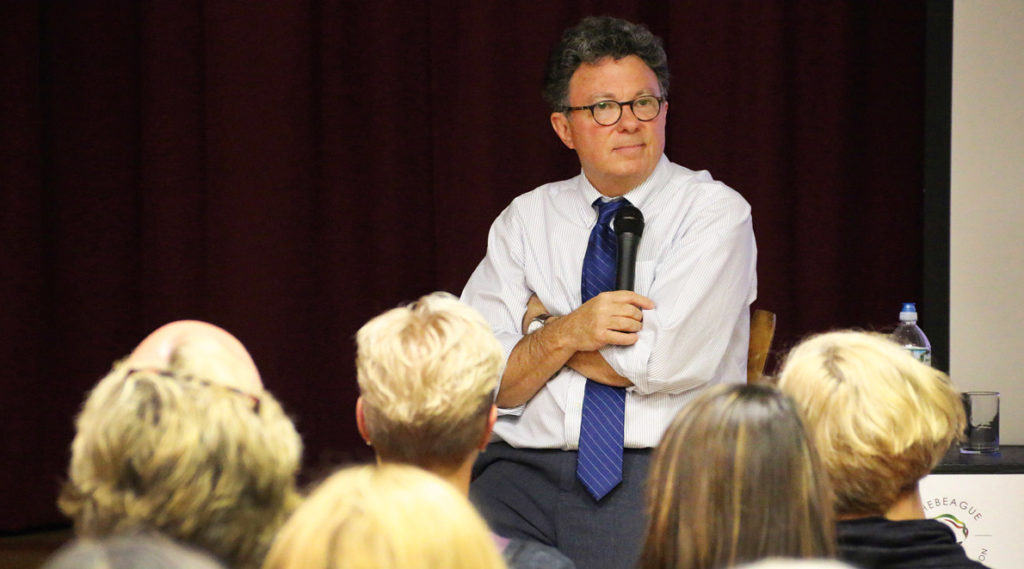Few would argue that public school classrooms are easier to manage today than they were 50 years ago. Or that children face fewer social pressures. Or that parents have more time.
But Ross Greene says the way educators and parents—and children—respond to the challenges of a fast-paced, pressure-filled environment is not working. Greene, who had been on the faculty of Harvard Medical School 20 years and is the author of books such as Raising Human Beings, is considered a national leader in developing a more effective approach to the conflicts parents and educators face with their children and students.
Faculty at the Chebeague Island School have been exploring Greene’s ideas and strategies, and the entire staff recently attended one of his workshops in Portland, where he now is based.
And on Oct. 26, the school, its parent association, and the island’s Recompense Fund brought Greene to speak to the community. In introducing Greene, island teacher Tammy Hoidal recounted how a student had hit her in the head with a metal lunchbox. Telling her father about the incident, he said, “Have you read The Explosive Child?” one of Greene’s books. “It changed my lens,” she continued, explaining she believes all children can succeed if given the chance to help solve their own problems.
“We capture that philosophy (at the school) day to day, hour to hour,” Hoidal said.
Greene set the stage for his ideas by describing the world today.
“I’ve never met parents as busy as parents are today,” Greene said. “In the last 20-30 years, stuff has happened in the world that makes it worse for kids. People are definitely being less kind, less patient, and listening less.”
Among children, anxiety, depression, and suicide rates are very high, he said. College students are less empathetic and more narcissistic than 10-15 years ago.
Behavior problems come when children are put in situations in which adult expectations outstrip their skills, whether it be math class or socializing with a group.
“All of us look bad when the expectations placed on us outstrip our skills,” Greene said. “Behavior is just the fever.”
CONSULTATION, NOT PUNISHMENT
Children without the skills might scream, bite, spit, have tantrums, cut themselves, and when older, drink or drug to excess, he said. Parents and schools respond with time-outs, detentions, suspensions, and finally incarceration.
Greene showed a video of a teen being held by four adult educators in what’s known as a “therapeutic hold,” and the boy later describing being put in a locked seclusion room in school.
As a therapist, Greene once employed some of these techniques.
“I was one of the people sitting on top of kids,” he said, “because I was told it calmed them down.” Expecting that response now seems absurd, he suggested.
Greene describes his new approach as collaborative and proactive, and said it is evidence-based.
“Carrots and sticks do not teach skills. Carrots and sticks do not solve problems,” he told the group. “Zero tolerance made things worse.”
The skills he teaches children are empathy, appreciating how behavior affects others, resolving disagreement without conflict, taking another’s perspective, and honesty.
“We forgot that (these skills) had to be taught explicitly. Everybody’s got some ugly in them,” Greene said. “What protects us from it? These skills.”
Demanding compliance with a one-size-fits-all model is doomed to fail.
The practical application comes in a shift from power and control to collaboration and influence. As an example, he described a parent who insisted the child make his bed every morning. The child struggled to comply, and Greene advised the parent to consider dropping the requirement.
It’s prioritizing, not capitulating, he explained.
While working at Long Creek Correctional Center in South Portland, where teens convicted of crimes are housed, Greene worked with a child who would walk out of a required class, despite strict rules against such behavior.
Greene met with the young man and learned he walked out when he might be required to read, because he was functionally illiterate and embarrassed about it.
The problem, then, was not the behavior, but the illiteracy.
While working in a psychiatric hospital, Greene counseled a man dubbed “the hitter” because of his penchant for striking staff and patients. He learned that the noises of the ward were intolerable to the man, so the hospital purchased noise-cancelling headphones for him, and the violence ended.
Greene described three steps he uses when behaviors are not acceptable: empathy (gathering information to understand the child’s concerns); defining the adult concerns (expectations); and inviting the child to collaborate on a solution that is realistic and mutually satisfactory.
The model calls for teachers or parents to meet with a child to discuss what might be an underlying problem triggering bad behavior, and engaging the child in finding a solution.
For more information, see livesinthebalance.org, where Greene shares his insights at no cost.





